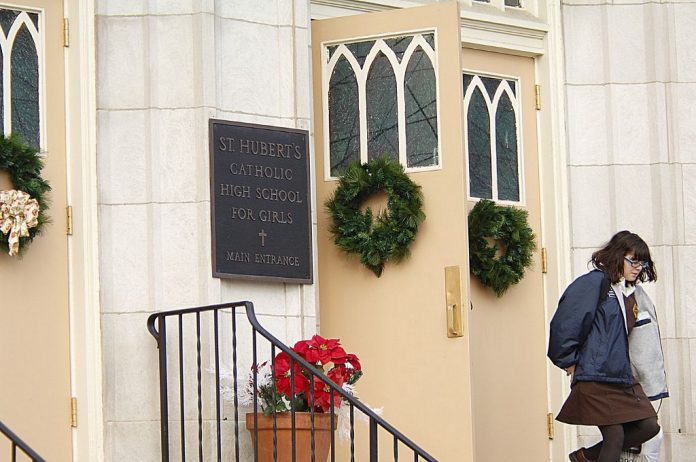Ed Hanway, former chairman and CEO of Cigna and a member of the Archdiocese of Philadelphia blue ribbon commission, offered some sobering statistics.
The archdiocese high schools and elementary schools educate about 68,000 students. That’s the same figure as 1911, but a huge drop from the 250,000 in 1961.
Baptisms are down 46 percent in the last 20 years, and the potential Catholic school pool is further hurt by charter schools.
On average, the tuition cost is about $1,500 less than the actual cost to educate a student. Parishes make up the difference, and their subsidy has skyrocketed 25 percent in the last 10 years.
“This simply can’t continue,” Hanway said.
That’s why the commission released recommendations that call for the closing of five high schools and 45 elementary schools.
The 16-member commission decided to act decisively. Hanway acknowledged that the recommendations would be controversial, but said they are necessary and long overdue.
The commission is not simply rearranging the deck chairs on the Titanic, according to Hanway. Instead, its recommendations include new school governance, advocacy for government assistance and a new foundation, likes the ones in Chicago, Los Angeles and Northern Colorado.
The 37-member report blamed dwindling enrollment on lower birth rates, shifting demographics and higher tuition.
“A number of our schools are simply not financially viable,” said commission chairman Jack Quindlen, a former senior vice president for DuPont whose alma mater, West Catholic High School, was among those recommended for closing.
The commission alerted pastors and school administrators of its plan a day or two ahead of the formal unveiling during a Friday morning meeting at Neumann University in Delaware County. The university is named in memory of St. John Neumann, who in the mid-19th century founded Philadelphia’s Catholic diocesan school system, the first of its kind in the United States.
After the meeting, high school presidents and principals whose schools will close broke the bad news to faculty and students.
Elementary school principals and pastors told staff, but generally allowed parents to tell their children.
The official list of closings was announced at a late-afternoon news conference at the archdiocese headquarters at 222 N. 17th St.
The high schools that will close are St. Hubert, West Catholic, Conwell-Egan, Monsignor Bonner and Archbishop Prendergast.
Of the elementary schools closing, 19 are in Philadelphia, 12 in Montgomery County, seven in Delaware County, five in Bucks County and two in Chester County.
Locally, three school buildings will close, with students moving north to nearby schools. Students from St. William in Lawndale will travel to St. Cecilia in Fox Chase. The kids from Our Lady of Ransom in Castor Gardens will go to Resurrection of Our Lord in Rhawnhurst. The youngsters in Tacony-based Our Lady of Consolation will head to St. Matthew in Mayfair.
In addition, St. Timothy in Lower Mayfair will absorb students from Pope John Paul II in Bridesburg.
The bigger schools that will take in students from the smaller schools might have to change their names and uniforms.
The closings continue a trend in the area. Northeast Catholic and Cardinal Dougherty high schools shut down in 2010. Mater Dolorosa, St. Joachim, St. Bartholomew, St. Leo and St. Bernard elementary schools have all closed their doors since 2003.
When the 2012–13 academic year begins, there will be 112 elementary schools and 13 high schools. Among elementary schools, just 63 will be parish-based. The other 49 will be so-called “regional” schools, which include students from one or more formerly low-enrollment schools.
The commission was established in December 2010 by Cardinal Justin Rigali. Today, the Rev. Charles J. Chaput leads the archdiocese.
Chaput, who came to Philadelphia from Denver in September, will welcome appeals.
“The sooner that can happen, the better,” he said.
Chaput acknowledged being in Philadelphia for only a short period of time, but added that he trusted the commission’s work.
“These are comprehensive recommendations,” he said.
Chaput explained that parishes will determine what happens to the soon-to-be-closed elementary school buildings.
The high school buildings that will be closed are owned by the archdiocese and likely will be sold.
Quindlen said the commission did not evaluate high schools based on a potential sale price.
“We never looked at the value of the real estate,” he said.
As for the next time schools will be evaluated for viability, Quindlen said, “If I gave you a year, I’d be lying to you.”
Chaput, though, leaped out of his seat to say that he expects no more closings for at least 10 to 15 years.
The archbishop added that, had Pennsylvania passed a school-voucher bill 15 years ago, many of the schools scheduled to close would have remained open.
Commission member Eleanor Dezzi, head of a political and business consulting firm and a West Catholic graduate, said Catholic school proponents should treat school choice as a social justice issue.
Until a voucher bill passes, Dezzi said, she favors increased funding for the state Educational Improvement Tax Credit, which gives incentives to businesses that donate to scholarship programs.
“That will be crucial to the future of our Catholic schools,” she said.
Teachers at elementary schools that will be partnered beginning in September must reapply for their jobs. The high school teachers are unionized, and the more senior instructors whose schools are closing will be able to “bump” less experienced teachers at schools that are remaining open.
Chaput lauded teachers for their dedication and sacrifices.
“We can never thank them enough,” he said.
The commission report is available at www.faithinthefuture.com ••





